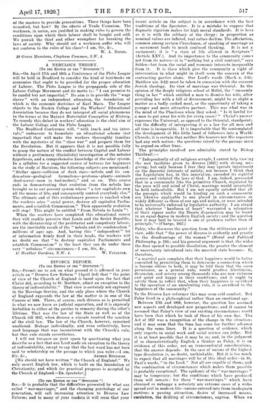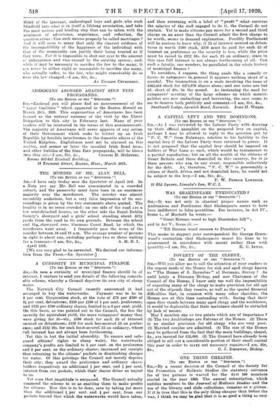(To THE EDITOR OF THE "-SPECTATOR."] Sta,—It is probable that
the difficulties presented by what are called " war-marriages," and the changing psychology of- our generation, will call increasing attention to Divorce Law Reform; and to many of your readers it will seem that your
recent article on the subject is in accordance with the best traditions of the Spectator. It is a mistake to suppose that dogmatic rigorism makes for high moral standards. It is here as it is with the celibacy of the clergy : in proportion as nominal values are inflated, real values decline. The affectation, common among certain Churchmen, of speaking of marriage as a sacrament leads to much confused thinking. It is not a sacrament; it is "a state of life allowed in Scripture" (Article XXV.). And its importance to the community comes not from its nature—it is " nothing but a civil contract," says Selden—but from the social and economic interests inseparable from it. It is these which give the community a right of intervention in what might in itself seem the concern of the contracting parties alone. Our Lord's words (Mark x. 2-12; Matthew xix. 3-12) must be taken in connexion with the current Jewish theology. Its view of marriage was Oriental. In the opinion of the deeply religious school of Hillel, the " unseemly thing in her " which entitled a man to dismiss his wife, after providing her with a bill of divorcement, might be so slight a matter as a badly cooked meal, or the opportunity of taking a younger and more attractive partner. This was what was in the mind of the Pharisees when they asked: "Is it lawful for a man to put away his wife for every cause? " Christ's answer expresses the Universal, as opposed to the Oriental, standpoint; but the difficulty of interpreting it as a law for all men and all time is insuperable. It is improbable that He contemplated the development of His little band of followers into a World- Church; it is certain that neither His hearers nor His reporters had any such notion: the questions raised by the passage must be argued on other lines.
The principles involved are admirably stated by Bishop Thirlwall :- " Independently of all religious scruple, I cannot help view;n7, the new facilities given to divorce [1857] with strong mis- giving; but only because I fear they may operate injuriously on the domestic interests of society, not because I think that the Legislature has, in this innovation, exceeded its rightful powers and violated the laws of God. I am, indeed, persuaded that in a community like the primitive Church, regulated by the pure will and mind of Christ, marriage would invariably be held indissoluble. But I am not equally satisfied that all the precepts which would he binding on such a community are likewise applicable to one placed in circumstances so widely different as those of our age and nation, or were intended to be universally enforced by legislative authority. I am afraid that whatever ` hardness of heart' warranted a relaxation of their rigour under the Mosaic dispensation may be found in an equal degree in modern English society; and the question how it may best be treated is one of prudence rather than of principle."—(Charge, 1857.) Paley, who discusses the question from the utilitarian point of view, adds that " the Dower of divorce is evidently and greatly to the disadvantage of the woman" (Moral and Political Philosophy, p. 216); and his general argument is that, the wider the door opened to possible dissolution, the greater the element of uncertainty introduced into the married state becomes. If, therefore, "a married pair complain that their happiness would be better consulted by permitting them to determine a connection which is become odious to both, it may be told them that the same permission, as a general rule, would produce libertinism, dissension, and misery among thousands who are now virtuous and quiet and happy in their conditions; and it ought to satisfy them to reflect that, when their happiness is sacrificed to the operation of an unrelenting rule, it is sacrificed to the happiness of the community."
To the Divorce Law reformer this may seem cold comfort. But Paley lived in a philosophical rather than an emotional age.
Between 1785 and 1920, however, the question has assumed new aspects and developed new proportions; and it cannot be assumed that Paley's view of our existing circumstances would have been that which he took of those of his own day. The Act of 1857 was a recognition of the change in the situation; and it may seem that the time has come for further advance along the same lines. It is a question of evidence, which only experts in social work and social science can judge. But it is at least possible that it may be so; and, in the judgment of so characteristically English. a thinker as Paley, it is on evidence of this order, not on transcendental considerations, that the answer depends. In the case of unions of the highest type dissolution is, no doubt, unthinkable. But it is too much to expect that all marriages will be of this ideal order—in St. Paul's words, "in the Lord." Not all are capable of them; and the combination of circumstances which makes them possible is probably exceptional. The epidemic of the "war-marriages " may be temporary; but the conditions which have produced them will remain : for these " war-marriages" which have obtained so unhappy a notoriety are extreme cases of a wide spread evil in modern life—unions entered into from inadequate motives; a passing attraction, desire of increased means, emulation, the drifting of circumstances,' caprice. When we
think of the ignorant, undeveloped boys and girls who rush blindfold into what is in itself a lifelong association, and-take tha most serious and binding step that can be taken with the minimum of advertence, -experience, and reflection, the question arises : Can such unions properly be calledmarriages ? And it will seem to many that only .the dearest evidence of the incompatibility of the happiness of the individual with that of the community can justify -their• being treated as if they were. Fur it is impossible to shut our eyes to the amount o' unhappiness and vice ;caused by the:existing system; and, while it may be necessary to sacrifice the few to the many, it can never be either .right -or reasonable to .sacrifice the many, who actually suffer, to the few, ;who -might conceivably do -so were the law changed.—I am,.Sir,
AN ENGLISH CHURCHMAN.



































 Previous page
Previous page